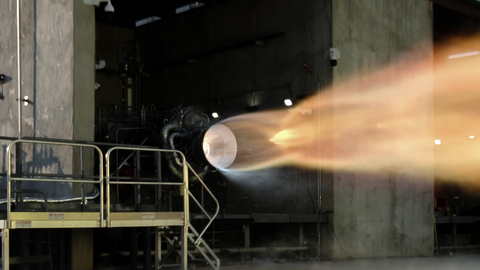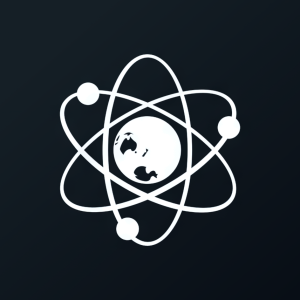Rocket Lab Completes Successful First Hot Fire of Archimedes Engine for Neutron Rocket
Rocket Lab USA, Inc. (Nasdaq: RKLB) has successfully completed the first hot fire test of its new Archimedes engine for the Neutron rocket. The test, conducted at NASA's Stennis Space Center in August 2024, achieved 102% power and anchored the engine's design ahead of Neutron's first flight scheduled for mid-2025. The Archimedes engine, designed for rapid reusability, will power both stages of the Neutron rocket and is capable of producing up to 165,000 pounds of thrust per engine.
Neutron is Rocket Lab's new reusable medium-lift rocket, designed to deliver up to 13,000 kilograms of payload to space. It features carbon composite structures and an innovative upper stage for complex satellite deployments, including mega-constellations. With this milestone achieved, Rocket Lab is moving into full production of flight engines and finalizing the qualification test campaign.
Rocket Lab USA, Inc. (Nasdaq: RKLB) ha completato con successo il primo test di accensione del suo nuovo motore Archimedes per il razzo Neutron. Il test, condotto presso il Stennis Space Center della NASA nell'agosto 2024, ha raggiunto il 102% di potenza e ha consolidato il design del motore in vista del primo volo del Neutron programmato per metà 2025. Il motore Archimedes, progettato per un rapido riutilizzo, alimenterà entrambe le fasi del razzo Neutron ed è in grado di generare fino a 165.000 libbre di spinta per motore.
Neutron è il nuovo razzo riutilizzabile di media capacità di Rocket Lab, progettato per consegnare fino a 13.000 chilogrammi di carico in orbita. Presenta strutture in composito di carbonio e un innovativo stadio superiore per complessi lanci di satelliti, comprese le mega-costellazioni. Con questo traguardo raggiunto, Rocket Lab sta passando alla produzione completa dei motori di volo e sta finalizzando la campagna di test di qualificazione.
Rocket Lab USA, Inc. (Nasdaq: RKLB) ha completado con éxito la primera prueba de encendido de su nuevo motor Archimedes para el cohete Neutron. La prueba, realizada en el Centro Espacial Stennis de la NASA en agosto de 2024, alcanzó el 102% de potencia y consolidó el diseño del motor antes del primer vuelo de Neutron programado para mediados de 2025. El motor Archimedes, diseñado para un rápido reutilización, impulsará ambas etapas del cohete Neutron y es capaz de producir hasta 165,000 libras de empuje por motor.
Neutron es el nuevo cohete reutilizable de elevación media de Rocket Lab, diseñado para entregar hasta 13,000 kilogramos de carga al espacio. Presenta estructuras de compuestos de carbono y un innovador etapa superior para despliegues complejos de satélites, incluidas mega-constelaciones. Con este hito alcanzado, Rocket Lab está avanzando hacia la producción a gran escala de motores de vuelo y finalizando la campaña de pruebas de calificación.
로켓랩 USA, Inc. (Nasdaq: RKLB)는 Neutron 로켓을 위한 새로운 아르키메데스 엔진의 첫 번째 호스트 테스트를 성공적으로 완료했습니다. 2024년 8월 NASA의 스텐니스 우주 센터에서 실시된 이 테스트는 102%의 출력을 달성했으며, 2025년 중반에 예정된 Neutron의 첫 비행을 앞두고 엔진 설계를 확고히 하였습니다. 아르키메데스 엔진은 빠른 재사용성을 위해 설계되었으며, Neutron 로켓의 두 단계 모두를 구동하며 165,000파운드의 추력을 생성할 수 있습니다.
Neutron은 로켓랩의 새로운 재사용 가능한 중형 로켓으로, 최대 13,000킬로그램의 payload를 우주로 운반하도록 설계되었습니다. 탄소 복합재 구조와 복잡한 위성 배치를 위한 혁신적인 상단 단계를 특징으로 하며, 메가-별자리도 포함됩니다. 이 이정표를 달성함으로써, 로켓랩은 비행 엔진의 대량 생산으로 이동하고 있으며, 자격 시험 캠페인을 마무리하고 있습니다.
Rocket Lab USA, Inc. (Nasdaq: RKLB) a réussi à réaliser le premier test de feu à chaud de son nouveau moteur Archimède pour la fusée Neutron. Le test, effectué au Centre spatial Stennis de la NASA en août 2024, a atteint 102% de la puissance et a renforcé la conception du moteur avant le premier vol de la Neutron prévu pour mi-2025. Le moteur Archimède, conçu pour une réutilisation rapide, propulsera les deux étages de la fusée Neutron et est capable de produire jusqu'à 165 000 livres de poussée par moteur.
Neutron est la nouvelle fusée réutilisable de moyenne capacité de Rocket Lab, conçue pour livrer jusqu'à 13 000 kilogrammes de charge utile dans l'espace. Elle possède des structures en composites de carbone et une étape supérieure innovante pour des déploiements compliqués de satellites, y compris des méga-constellations. Avec cette étape franchie, Rocket Lab passe à la production complète des moteurs de vol et finalise la campagne de test de qualification.
Rocket Lab USA, Inc. (Nasdaq: RKLB) hat erfolgreich den ersten heißen Test seines neuen Archimedes-Triebwerks für die Neutron-Rakete abgeschlossen. Der Test, der im August 2024 im Stennis Space Center der NASA durchgeführt wurde, erreichte 102% Leistung und festigte das Design des Triebwerks vor dem ersten Flug der Neutron, der für die Mitte 2025 geplant ist. Das Archimedes-Triebwerk, das für eine schnelle Wiederverwendbarkeit ausgelegt ist, wird beide Stufen der Neutron-Rakete antreiben und ist in der Lage, bis zu 165.000 Pfund Schub pro Triebwerk zu erzeugen.
Neutron ist die neue wiederverwendbare Mittelklasse-Rakete von Rocket Lab, die dafür ausgelegt ist, bis zu 13.000 Kilogramm Nutzlast ins All zu bringen. Sie verfügt über carbonfaserverstärkte Strukturen und eine innovative obere Stufe für komplexe Satellitenstarts, einschließlich Mega-Konstellationen. Mit diesem Meilenstein hat Rocket Lab den Übergang zur vollständigen Produktion der Flugtriebwerke vollzogen und die Qualifikationstestkampagne abgeschlossen.
- Successful first hot fire test of Archimedes engine, reaching 102% power
- On track for Neutron's first launch in mid-2025, potentially the fastest development of a commercial medium-class launch vehicle
- Archimedes engine capable of producing up to 165,000 pounds of thrust
- Neutron rocket designed to carry up to 13,000 kilograms of payload
- Moving into full production of flight engines
- None.
Insights
The successful hot fire test of Rocket Lab's Archimedes engine marks a significant milestone in the development of the Neutron rocket. Achieving
The Archimedes engine's design, featuring oxidizer-rich staged combustion and the use of liquid oxygen and LNG propellants, suggests a strong emphasis on reusability and performance. The 3D printing of critical components could lead to cost reductions and manufacturing flexibility. With nine engines producing 1,450,000 lbf of thrust, Neutron appears well-positioned to compete in the medium-lift launch market.
Rocket Lab's progress with the Archimedes engine and Neutron rocket development could have positive implications for the company's financial outlook. The potential to bring Neutron to market by mid-2025, faster than competitors, may give Rocket Lab a first-mover advantage in the evolving medium-lift launch sector.
The focus on reusability and cost-effectiveness in Neutron's design could lead to improved profit margins and competitiveness in pricing. Additionally, the versatility of Neutron for various mission types, including mega-constellation deployments, positions Rocket Lab to capture a larger market share in the growing satellite launch industry. However, investors should monitor development costs and potential delays, as these could impact the company's near-term financial performance.
The medium-lift launch market is becoming increasingly competitive and Rocket Lab's progress with Neutron could significantly alter the landscape. The 13,000 kg payload capacity puts Neutron in direct competition with established players like SpaceX's Falcon 9 and emerging vehicles like Blue Origin's New Glenn.
Rocket Lab's emphasis on rapid reusability and innovative design features like the carbon composite structures could differentiate Neutron in the market. The ability to serve both commercial and government customers, particularly in deploying satellite mega-constellations, aligns well with projected market demand. If Rocket Lab can maintain its accelerated development timeline, it may capture a significant portion of the growing medium-lift launch market before some competitors enter the field.

Rocket Lab's Archimedes engine has completed a successful hot fire, a key development milestone ahead of the first Neutron rocket launch in mid-2025. (Photo: Business Wire)
Rocket Lab’s engineers completed the hot fire test at the Company’s Engine Test Complex within NASA’s Stennis Space Center in
Rocket Lab founder and CEO, Sir Peter Beck, says: “Hot firing Archimedes is a major development milestone for Neutron and our team has done it on an accelerated timeline. Taking a new staged combustion liquid rocket engine from cleansheet design to hot fire in just a couple of years is industry-leading stuff. We’ve been consistently impressed with the performance of Archimedes in test, including with this hot fire, so with this critical milestone completed, we move into production of flight engines confidently and begin to close out the qualification test campaign in parallel to really hone performance for launch next year. From the day we started designing Archimedes we focused on delivering a flight engine, rather than an early-stage prototype destined for multiple reworks and adjustments, so it's gratifying to see this strategy bear fruit.”
The Archimedes engine will power Rocket Lab’s new reusable medium-lift rocket Neutron, a next-generation challenger to deliver a cost-effective, reliable, and responsive launch service for commercial and government missions. The advanced design of Neutron includes carbon composite for all of the rocket’s major structures and an innovative upper stage that enables high-performance for complex satellite deployments, including the deployment of satellite mega-constellations.
The Archimedes engine is an oxidizer rich staged combustion cycle engine that will power the reusable first stage of Neutron and the new rocket’s second stage that is designed to carry up to 13,000 kilograms of payload to space. Capable of producing up to 165,000 (733 kilonewtons) pounds of thrust per engine, Archimedes operates at lower stress levels than other rocket engines to enable rapid and reliable reusability. The combined thrust of nine Archimedes engines for Neutron’s first stage is designed to reach 1,450,000 lbf total. Archimedes uses a cryogenic propellant mix of liquid oxygen and LNG to enable higher reusability and performance, and many of its critical components are 3D printed including Archimedes’ turbo pump housings, pre-burner and main chamber components, valve housings, and engine structural components.
Production of the Archimedes engines takes place at Rocket Lab’s Engine Development Complex in
+ About Rocket Lab
Founded in 2006, Rocket Lab is an end-to-end space company with an established track record of mission success. We deliver reliable launch services, satellite manufacture, spacecraft components, and on-orbit management solutions that make it faster, easier, and more affordable to access space. Headquartered in
+ Forward Looking Statements
This press release contains forward-looking statements within the meaning of the Private Securities Litigation Reform Act of 1995. We intend such forward-looking statements to be covered by the safe harbor provisions for forward looking statements contained in Section 27A of the Securities Act of 1933, as amended (the “Securities Act”) and Section 21E of the Securities Exchange Act of 1934, as amended (the “Exchange Act”). All statements contained in this press release other than statements of historical fact, including, without limitation, statements regarding our launch and space systems operations, launch schedule and window, safe and repeatable access to space, Neutron development, operational expansion and business strategy are forward-looking statements. The words “believe,” “may,” “will,” “estimate,” “potential,” “continue,” “anticipate,” “intend,” “expect,” “strategy,” “future,” “could,” “would,” “project,” “plan,” “target,” and similar expressions are intended to identify forward-looking statements, though not all forward-looking statements use these words or expressions. These statements are neither promises nor guarantees, but involve known and unknown risks, uncertainties and other important factors that may cause our actual results, performance or achievements to be materially different from any future results, performance or achievements expressed or implied by the forward-looking statements, including but not limited to the factors, risks and uncertainties included in our Annual Report on Form 10-K for the fiscal year ended December 31, 2023, as such factors may be updated from time to time in our other filings with the Securities and Exchange Commission (the “SEC”), accessible on the SEC’s website at www.sec.gov and the Investor Relations section of our website at www.rocketlabusa.com, which could cause our actual results to differ materially from those indicated by the forward-looking statements made in this press release. Any such forward-looking statements represent management’s estimates as of the date of this press release. While we may elect to update such forward-looking statements at some point in the future, we disclaim any obligation to do so, even if subsequent events cause our views to change.
View source version on businesswire.com: https://www.businesswire.com/news/home/20240808926407/en/
+ Rocket Lab Media Contact
Morgan Connaughton
media@rocketlabusa.com
Source: Rocket Lab USA, Inc.







